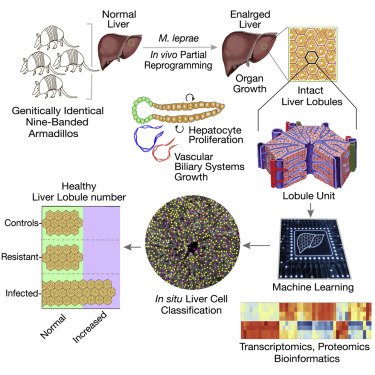I was checking some science news this morning and stumbled upon a really interesting and bizarre paper in the field of tissue regeneration.
My guess is you have probably heard of leprosy, a disease that is pretty much"forgotten" in the western world. If you haven't, Wikipedia has a great article on it https://en.m.wikipedia.org/wiki/Leprosy , feel free to check it out.
Anyways, in this new paper researchers have discovered that Mycobacterium leprae (the bacterium responsible for the disease) promotes the regrowth of liver tissue. Of course this isn't a selfless act, it's for the bacterium to have more tissue to infect 😅 But what's really interesting is that the regrown tissue is not defective or cancerous but totally healthy and functional.
Don't get your hopes super up though, as this research was done on armadillos. And armadillos aren't... human so the microorganism may exhibit a totally different behavior on us. Still, an interesting and promising research!
Below follows a photo from the study and the abstract

Summary
Ideal therapies for regenerative medicine or healthy aging require healthy organ growth and rejuvenation, but no organ-level approach is currently available. Using Mycobacterium leprae (ML) with natural partial cellular reprogramming capacity and its animal host nine-banded armadillos, we present an evolutionarily refined model of adult liver growth and regeneration. In infected armadillos, ML reprogram the entire liver and significantly increase total liver/body weight ratio by increasing healthy liver lobules, including hepatocyte proliferation and proportionate expansion of vasculature, and biliary systems. ML-infected livers are microarchitecturally and functionally normal without damage, fibrosis, or tumorigenesis. Bacteria-induced reprogramming reactivates liver progenitor/developmental/fetal genes and upregulates growth-, metabolism-, and anti-aging-associated markers with minimal change in senescence and tumorigenic genes, suggesting bacterial hijacking of homeostatic, regeneration pathways to promote de novo organogenesis. This may facilitate the unraveling of endogenous pathways that effectively and safely re-engage liver organ growth, with broad therapeutic implications including organ regeneration and rejuvenation.
Link to paper - > https://www.cell.com/cell-reports-medicine/fulltext/S2666-3791(22)00379-2?_returnURL=https%3A%2F%2Flinkinghub.elsevier.com%2Fretrieve%2Fpii%2FS2666379122003792%3Fshowall%3Dtrue
And here's a dumbed down article about the study from BBC along with some remarks from the authors -> https://www.bbc.com/news/health-63626239
Have fun reading!
Posted with STEMGeeks






